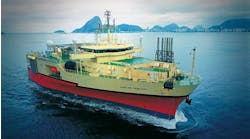French suppliers enhance reputation as worldwide contracting force
- Schematic of Seamet International/Chantiers de l'Atlantique's multipurpose column-stabilized vessel for completion/workover duties. This is one of several new concepts by French joint ventures aimed at the new generation of deepwater fields off West Africa
Out of necessity, these services are exported, as there is no indigenous offshore oil and gas production in France. And the figures were attained against a background of declining support from traditional benefactors such as the government and Elf.
GEP, the French oil and gas service association, was formed to help the contractors build their presence overseas, partly in support of the French oil companies. According to GEP's executive vice-president Victor Vachier, there was a strong political will in the 1970s and 80s to drive Elf and Total to supply half of France's crude needs. This helps explain why today, the two companies are so influential in all the world's main offshore and onshore arenas.
However, in the 1990s the tide has turned against state-ownership in the oil industry. Both Total and Elf are now privatized, and in one respect, that policy cannot be faulted, says Vachier, as both are now ranked respectively 11 and 10 in the list of world majors.
The downside for French contractors is that they have struggled increasingly for revenue as Elf in particular has relinquished individual shareholdings to concentrate on its own profitability. Today French SMEs are allocated just over $100 million annually by the government for R & D, and the Institut du Petrole provides assistance through its partly government-funded research program. But otherwise, the contractors are aided less than in other European nations.
Some of the large contractors have responded, Vachier points out, by forming alliances such as those between Coflexip and Stena, Comex and Stolt, Bouygues Offshore and Saipem and ETPM with McDermott. "This reflects that their assets are not as big as they should be, now that there is a change in the behavior of the oil companies.
"In the past, the oil companies promoted technologies. Today they want to buy technologies off the shelf, so they are looking for contractors able to sell them technical and sometimes financial solutions. Take FPSOs. If some shipping company can lease instead of investing in a production ship, they may take this solution. So contractors must become stronger technically and financially to be able to propose these types of packages."
Self-promotion
In some cases, loosening of ties may have had a positive effect, forcing some contractors to market themselves more strongly. Following Elf's withdrawal as a major shareholder, CGG has recovered from a perilous financial situation to emerge as one of the world's top three geophysical contractors. Today it can perform every kind of 3D seismic survey and all types of reservoir monitoring.
ETPM International is currently the dominant force in Norwegian gas trunkline installations. Its program this year is dominated by the new NorFra submarine line to Dunkerque, at 830 km the world's longest. Bouygues Offshore has been active in new platform, pipeline and oil terminal developments in Vietnam, Australia and the Black Sea. Coflexip has overcome technical problems with riser sheaths to achieve a currently unassailable position for deepwater pipelay off Brazil.
At the same time, strong links are retained by Elf and Total with the French contractors, particularly in the French-speaking territories of West Africa and in South East Asia. There are more prospects for collaboration as these two companies maintain exploration successes in deeper waters.
For Elf, last year was dominated by first oil from the N'kossa Field off Congo and from Cobo off Angola. N'kossa oil came through the world's largest concrete-hulled production barge, designed and commissioned by Bouygues Offshore for duty in 170 meters of water. This January, the barge also began offloading gas treated onboard as LPG. Cobo, meanwhile, featured the application of Technip-Geoproductions's integrated deck floatover installation method, UniDeck. The technique avoids the need for expensive heavy lift barges.
In the North Sea, another patented Technip-Geoproduction design, the TPG 500 production jack-up, has just been selected for Elf UK's major new HT/HP gas condensate development, Elgin/Franklin. Technip-Geoproduction will also hope to sell its deep draft version of this concept, the TPG 3300, to future Elf deepwater developments in the Gulf of Guinea. Among these are Moho, close to N'kossa, and Girassol in Block 17 off Angola.
As well as being West Africa's deepest offshore discovery to date, in over 1,300 meters of water, Girassol could also be the largest, with perhaps 1,000MM bbl of recoverable oil. The indications are that Elf is looking at an FPSO conversion to produce oil on the field over a 20-30 year lifespan. Around the same time, Elf may be ready to produce hydrocarbons from its new Shah Deniz permit in the Azeri Caspian.
Total also has oilfield development prospects off Angola, namely Espadarte North and Veleiro, which could be developed jointly. Elsewhere, Total is involved in major new developments offshore Iran, Myanmar as well as the Bongkot Field expansion in Thailand. This summer it is preparing to drill in Ireland's deepwater Porcupine Basin. In Tierra del Fuego, southern Argentina, Total is working with IFP and French reservoir engineering company Geoservices to access offshore gas and oil via 8-km long horizontal wells drilled from land. Total has become very experienced in deviated wells through projects in Thailand, the North Sea and Venezuela.
Copyright 1997 Oil & Gas Journal. All Rights Reserved.


